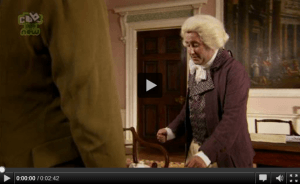 Sitting in his splendid wooden box in South Cloisters , Jeremy Bentham is a slightly eccentric and potent reminder of the rich history of UCL.
Sitting in his splendid wooden box in South Cloisters , Jeremy Bentham is a slightly eccentric and potent reminder of the rich history of UCL.
This blog written by 2nd year Department of English student, Ellie Pearce and perfectly captures the moment JB awakens in the middle of UCL digifest and records his thoughts…..
My dear UCL Students,
It was a great pleasure to attend your Digifest event in November of last year, a truly splendid week of events that enlightened me on many modern issues of technology and computing.
It took me a little while to digest this new-fangled concept of the ‘Internet’ of which you all so often speak, yet having come to terms with the ‘smartphone’ and the ‘Mac Book’ – not in fact a book at all, but a rather valuable looking object that allowed me to share my thoughts about Digifest with you all ‘on the web’ – a new-term of phrase that several have since reassured me has nothing whatsoever to do with arachnids.
Once I began to understand the value of being able to share one’s thoughts and ideas with the entire world in one moment without the need to spend decades of one’s life writing arduous letters, I was truly amazed, and feel that I can only support what is such an excellent platform for promoting equality and spreading the importance of utilitarian values.
One particular lecture, expertly delivered by Mr Javier Sajuria and Mr Paolo Morini, spurred my interest as I recognised in their discussion elements of my own utilitarian theories. Their argument explored whether our use of the Internet might change politics and make politicians more accountable for their wrongdoings, or whether reading information online might encourage younger people to vote in parliamentary elections. (I was delighted to see that women were also allowed to vote in these modern times. I’ll let JS Mill know – he’ll have a field day.)
My unshakable belief in the principle of ‘the greatest happiness for the greatest number’ meant I was immensely encouraged to hear Mr Sajuria argue the case that yes, the ‘Internet’ was able to facilitate campaigns and improve the lives of the needy by making politicians accountable for their unfavourable actions. I learnt much about the ‘Occupy’ movement, a group coordinated through the Internet across the world to protest against social inequality and injustice. For the first time in my experience, I heard of different countries and even continents being able to correspond with ease and using the Internet to band together for a common cause of social equality. This is fantastic news!
If I may take a moment to mention my ‘Hedonic Calculus’ (my way of measuring the amount of pleasure or displeasure an action produces), the mild displeasure experienced by those complaining about ‘Occupy’ taking over public spaces is vastly diminished by the mass pleasure this could bring about for the needy, should governments take heed of their campaign. As an action that therefore produces more pleasure in the world than it does pain, I greatly admired the work of ‘Occupy’. I may go and purchase myself a tent.
We continued to talk about the importance of online petition websites such as Change.org in swaying negative government decisions, and then spoke of how the Internet is sometimes used by politicians to raise money for their political campaigns (I’m not too sure this pleases me). It certainly seemed a valid argument that this new ‘Internet’ has an ability to sway politics, for good or for bad.
Mr Sajuria also mentioned the important influence of online group ‘Anonymous’, a concept that greatly piqued my interest. The idea of a group worldwide attacking social injustice seems an excellent and rather exciting idea, although I was a little perturbed that all of their members look uncannily alike to that fellow who tried to blow up Parliament a century or so back. Perhaps I need my eyesight checking.
He then went on to discuss the alternative: why the Internet might not be so helpful in changing negative political behaviour. We talked about the attitude of ‘slacktivism’, a concept as vulgar as the word itself sounds. I was appalled at the suggestion that modern individuals hear about issues of hardship abroad, but feel they are too remote to cause change and so do nothing to fix the problem until it begins directly affecting their home country. It greatly angered me that in a society where every man, woman and child has the ability to look in their MacBook and see the entire world before them, they will do so little to offer help to their fellow man. Such disproportionate pain throughout the poorest parts of the world surely needs to be addressed with the due attention it deserves.
An example of this was the ‘Ebola virus’ – I will not labour into trying to explain the concept of this ‘virus’, a sinister little being floating around in the air with a sole aim to murder each and every one of us (such beings would do well to take my Hedonic Calculus into their consideration) – a disease that is killing thousands in the continent of Africa. The deaths there are ignored by many as being too distant, yet only when we hear the slightest hint that the little creature has flown its way to Britain is the country in an uproar.
Mr Sajuria also mentioned the dangers of government censoring our activity online – it appears that whilst we common men are privy to use the Internet for our own design, it is not ourselves that have the final jurisdiction over what we write. When this censorship intends to cover parliament’s misdoings against the needy I am certain to object, yet if it is used to control online crime and limit pain, I may give my support to it.
Yet through our discussion, it became clear that although the Internet connects diverse nations across the world (such a thing can only be praised if it leads to greater equality and happiness), all change takes time, even when promoted through your modern computers. What I came to understand was that today’s Internet activism, although coordinated online, is much like the concept of protesting in my own lifetime – a fight for social change cannot happen overnight, with or without your modern technology.
I hope that you, students of UCL, might consider the great moral value that the Internet can offer you. Speaking from a time of no electricity, of no Mac Book’s or smartphones, no aeroplanes or safe means of long-distance travel, I can only hope that you will use your new technology positively to promote equality, happiness and goodness for the greatest number.
For now, goodbye. I’ll see you around the cloisters.
Yours,
Jeremy Bentham
Be inspired to find your own clips and programmes on BoB about JB – he’s a popular bloke !
Horrible Histories (from Box of Broadcasts)
Historical sketch show featuring the rather eccentric Georgian philosopher Jeremy Bentham and super-rich Roman politician Crassus, who raps about his blinging lifestyle. [AD,S]

Horrible Histories, [television programme, online], Prod. credit n.k., Prod. company n.k., Prod. country n.k., 16:30 30/5/2013, CBBC Channel, 30mins. http://bobnational.net/record/_zYIBjDOfp2GxFOIWI7IlIQ, (Accessed 05/10/2015).
YouTube clips:
- Bentham’s Utilitarianism, [user generated content, online] Professor Zaldivar, UK, 30/01/2015, 8mins 09secs. https://youtu.be/8iygKLQsinU (accessed 05/10/15)
- Jeremy Bentham: Man and Myth (UCL), [user generated content, online], Professor Philip Schofield, UK, 19/08/2010, 16mins 38secs. https://youtu.be/ZCwhKCqdINY (accessed 05/10/15)
- The Man Who Had Himself Taxidermied: Jeremy Bentham, [user generated content, online] Tom Scott, UK, 14/10/2015, 3mins 58secs. https://youtu.be/mh1UXi0csqc (accessed 05/10/2015)
Other Links:
The Bentham Project and Transcribe Bentham team. If you’d like to help out with their crowd sourced transcription, you can find information here: http://blogs.ucl.ac.uk/transcribe-bentham/about/
 Close
Close











